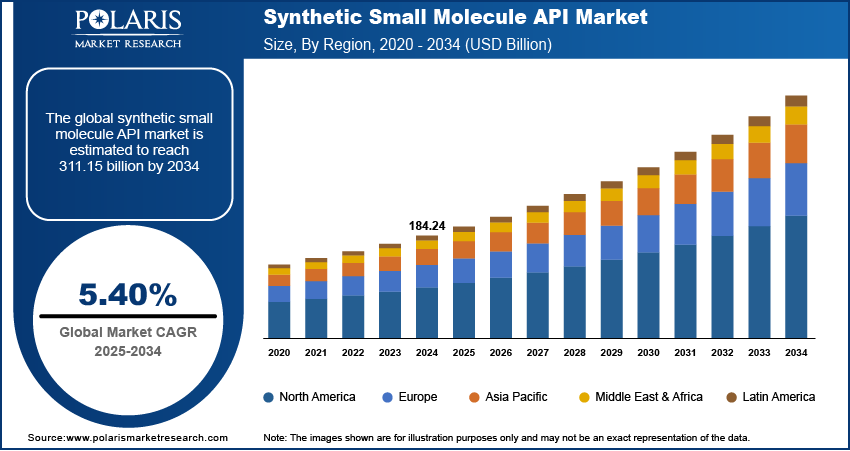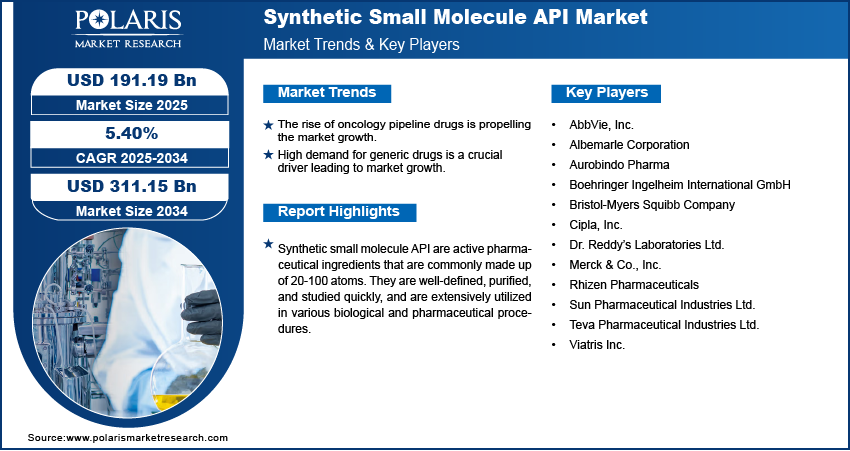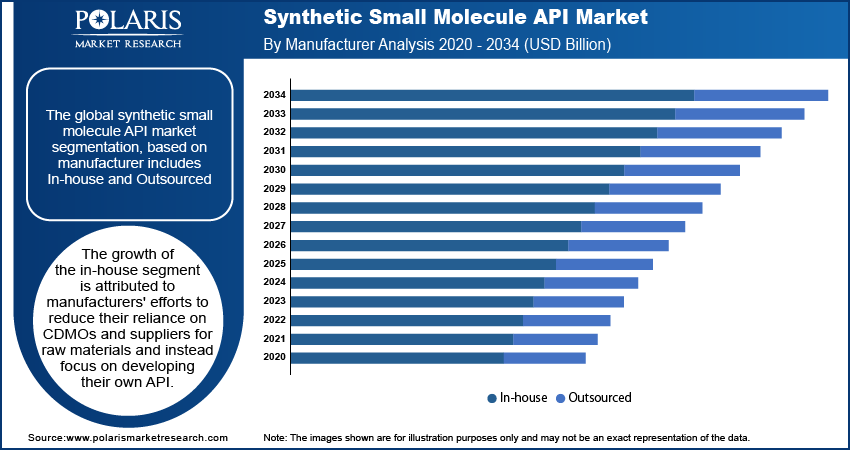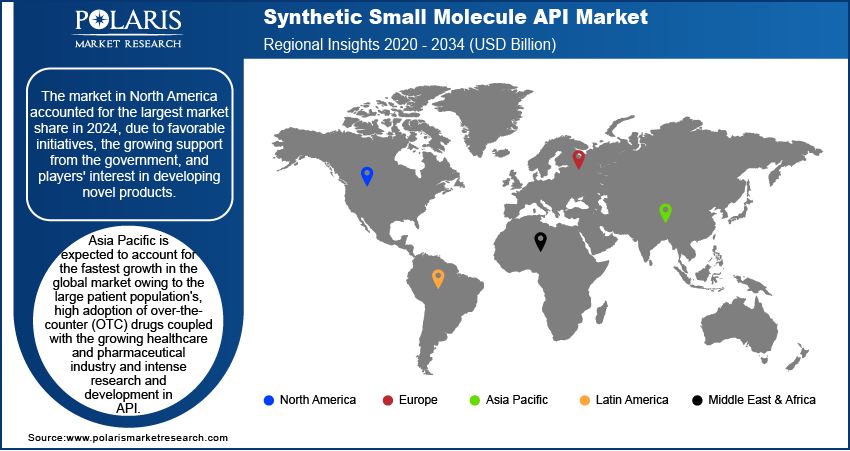
Synthetic Small Molecule API Market Share, Size, Trends, & Industry Analysis Report
: By Application (Cardiology, Oncology, Orthopedic, CNS & Neurology, Nephrology, Pulmonology, Endocrinology, Gastroenterology, Ophthalmology, Others), By Manufacturer, By Region -Market Forecast, 2025 – 2034
- Published Date:Sep-2025
- Pages: 118
- Format: PDF
- Report ID: PM2684
- Base Year: 2024
- Historical Data: 2020-2023
Overview
The global synthetic small molecule API market size was valued at USD 184.24 billion in 2024 and is anticipated to grow at a CAGR of 5.40% from 2025 to 2034. Key factors driving demand for synthetic small molecule API include rising global prevalence of chronic diseases, an aging population, and growing demand for generic drugs.
Key Insights
- In-house accounted for the largest market share in 2024. This is due to manufacturers' efforts to reduce their reliance on CDMOs and suppliers for raw materials.
- The cardiology segment accounted for the largest revenue share in 2024 due to the increasing prevalence of target diseases.
- The market in North America accounted for the largest revenue share in 2024, owing to favorable initiatives.
- Asia Pacific is expected to account for the fastest growth in the global market owing to the high adoption of over-the-counter (OTC) drugs.
Industry Dynamics
- The rise of oncology pipeline drugs is propelling the market growth.
- High demand for generic drugs is a crucial driver leading to market growth.
- Growing aging population across the globe are creating a lucrative market opportunity.
- The complex manufacturing of synthetic small molecule API may hamper the market growth.
Market Statistics
- 2024 Market Size: USD 184.24 Billion
- 2034 Projected Market Size: USD 311.15 Billion
- CAGR (2025-2034): 5.40%
- North America: Largest Market Share

To Understand More About this Research: Request a Free Sample Report
AI Impact on Synthetic Small Molecule API Market
- AI helps in drug discovery by identifying potential synthetic small molecule structures.
- AI helps in reducing time and cost in API production.
- AI ensures consistency, detecting impurities and improving regulatory compliance.
- AI helps in forecasting demand and manage raw material supply chains.
Synthetic small molecule API are active pharmaceutical ingredients that are commonly made up of 20-100 atoms. They are well-defined, purified, and studied quickly, and are extensively utilized in various biological and pharmaceutical procedures. They are effective inducible modifiers and enzyme inhibitors due to their typical physicochemical characteristics and tiny size. Furthermore, these molecules are highly effective in preventing, diagnosing, and treating diseases. Owing its numerous applications commonly in the healthcare industry have driven the industry’s growth.
The industry's expansion is further attributed to the low cost of manufacturing associated with synthetic small molecules and their incredible effectiveness. Around 78% of all APIs, most of the drugs patients take, are synthetic small molecules. This increases the demand for finished products and API formulation, which fuels the growth of the synthetic small molecule API market.
Even though numerous causes are driving the development of synthetic small APIs, there is still deficient public awareness of the same. This is especially true for developing nations with their poor economic standards. However, budgetary restrictions and the healthcare infrastructure in these countries could provide complicated challenges for the global industry.
The Covid-19 pandemic has positively impacted the synthetic small molecule API market as demand eventually grew during the pandemic owing to the respiratory system impairment in patients suffering from the infection. The pandemic facilitated the industry’s growth by encouraging players to diversify their businesses and to avoid shortages geographically. COVID-19 is further driving the investigation of synthetic small molecule products. Additionally, studies for repurposing existing synthetic small molecule drugs are ongoing to treat SARS-CoV-2 infection.

Know more about this report: Request for sample pages
Industry Dynamics
Growth Drivers
Despite many prominent contract manufacturing organizations (CMOs) investing in advanced therapy medicinal product (ATMP) capabilities in recent years and increasing the use of biologic APIs in both the pipeline and among marketed drugs, the majority of marketed drugs are small molecules. With the rise of oncology pipeline drugs driving the increase in high potency, combined with synthetic small or virtual pharma companies being unable to acquire or access containment capabilities in-house, the demand for innovative specialized synthetic small molecule capabilities will remain high.
High demand for generic drugs is a crucial driver leading to market growth. API for these drugs generates high revenue for chemical and synthetic manufacturing companies. This factor is creating an opportunity for contract development and manufacturing companies working for it, owing to the growth in outsourcing trend as companies want to enhance profitability by reducing the cost of production, which is anticipated to influence the market's growth.
The market's growth is witnessed by the ease of production associated with synthetic small molecules and the high effectiveness possessed by these molecules. Furthermore, these represent a good amount of the total share representing the majority of medicines consumed, which amplifies the demand for finished products and formulation of API. Additionally, rapid growth in several corporate agreements has propelled the industry. For instance, BASF pharma sold its OMEGA 3 manufacturing facility to Marine Ingredients in Norway.
Which Innovations are Expected to Boost the Synthetic Small Molecule API Market in the Coming Years?
The market is witnessing a transformation driven by innovations in advanced synthetic routes and green chemistry. High-potency APIs (HPAPIs) and complex molecule synthesis enable treatments for oncology, rare diseases, and other high-value therapeutics. Digitalization, including AI-based process optimization and digital twins, is enhancing reaction efficiency, reducing batch failures. Modular manufacturing and specialized CDMO services enable faster scale-up, multi-product flexibility, and regulatory-compliant production. Market players are adopting these innovations for efficiency, scalability, and quality in API production. The adoption helps them stay ahead in the competition. This factor boosts the industry expansion. The following table contains key innovations in the industry with their key features and impact:
|
Innovation |
Key Features |
Market Impact |
|
Advanced Synthetic Routes and Green Chemistry |
Continuous flow chemistry, atom-efficient synthesis, and biocatalysis Eco-friendly solvents |
Higher yields, reduced environmental impact, and lower cost |
|
Novel Process Development and Modular Manufacturing |
Modular units, Process Analytical Technology (PAT), and multi-product capabilities |
Reproducible high-purity APIs, faster scale-up, and reduced time-to-market |
|
High Potency API (HPAPI) and Complex Molecule Synthesis |
Chiral molecules, oncology/rare disease HPAPIs, and stereoselective synthesis |
Enables treatment of complex diseases and supports high-value therapeutic pipelines |
|
Digitalization and AI-Enabled Process Optimization |
Adoption of AI and ML for reaction optimization, predictive modeling, and digital twins |
Reduced batch failures, cost efficiency, and faster development |
|
Continuous Manufacturing and Flow Chemistry Adoption |
Shift from batch to continuous flow and integrated with quality-by-design (QbD) |
Improved control, consistency, scalability, and regulatory compliance |
|
Regulatory-Driven Innovation |
Controlled impurities, traceable supply chains, and validated analytics |
Enhanced quality, compliance and a faster approval process |
|
Specialized CDMO Services |
End-to-end API development, scale-up expertise, and custom synthesis |
Reduces internal R&D burden, enables complex chemistries, and mitigates risks |
Report Segmentation
The market is primarily segmented based on manufacturer, application and region.
|
By Manufacturer |
By Application |
By Region |
|
|
|
Know more about this report: Request for sample pages
In-house Accounted for the Largest Market Share in 2024
The growth of the in-house segment is attributed to manufacturers' efforts to reduce their reliance on CDMOs and suppliers for raw materials and instead focus on developing their own API. For instance, Lonza launched a new synthetic small-molecule manufacturing complex to enhance future small-molecule technologies expansion in April 2024.
The outsourced segment is supposed to grow faster over the forecast period. The growing shift of manufacturing companies towards contract research and development organizations for the production of API commercially is increasing, showing the fastest growth of the segment. For instance, Curia, a CDMO, invested in expanding its commercial manufacturing capacity at its Rensselaer, New York facility. Furthermore, increasing demand for the requirement of complex manufacturing processes further drives the growth of the segment.

Cardiology Segment Accounted for the Largest Market Share in 2024
The cardiology segment accounted for the largest market due to the increasing prevalence of target diseases worldwide owing to changes in lifestyles and food habits. Additionally, the rising number of patients from various cardiovascular diseases along with the increased implementation of treatment for cardiovascular conditions has driven the segment's growth. According to WHO, cardiovascular disorders are the most common cause of death worldwide.Overweight and obesity in people have raised their blood pressure and blood glucose level leading to cardiovascular disorders. According to WHO, significant cardiovascular deaths are due to heart attacks and strokes, and most of these deaths occur prematurely in people under the age of 70. Small-molecule synthesis is essential for the development and effectiveness of numerous pharmaceutical medicines, from over-the-counter analgesics to life-saving medications for cardiovascular disease. For instance, EUROAPI's current synthesis portfolio includes approximately 60 small-molecule API references with several therapeutic applications for both humans and animals.
North America Dominated the Revenue Share in 2024
The market in North America accounted for the largest market share in 2024, due to favorable initiatives, the growing support from the government, and players' interest in developing novel products. For instance, in 2021, AbbVie announced the U.S. FDA approval of Qulipta (atogepant) for episodic migraine in adults as the medication-only oral antagonist of the calcitonin gene-related peptide receptor. Furthermore, the government in this region is becoming supportive in terms of regulation of API production, which further has reduced the region's dependence on Asian manufacturers.
Asia Pacific is expected to account for the fastest growth in the global market owing to the large patient population's, high adoption of over-the-counter (OTC) drugs coupled with the growing healthcare and pharmaceutical industry and intense research and development in API. According to IBEF, Indian pharmaceutical companies increased investment in R&D, driving the market growth in this region. Moreover, the growing aging population and increasing incidence of chronic diseases is propelling the market growth.

Competitive Insight
The synthetic small molecule API market is projected t increase as demand for cost-effective medicines continues to rise. Large producers work on expanding their facilities, improving synthesis methods, and keeping pace with strict regulatory standards. Meanwhile, smaller and regional firms compete by offering lower-cost supply and flexible services. Partnerships with pharmaceutical companies and investments in emerging markets are becoming more common as businesses look to expand reach. Growth in pressure to reduce environmental impact is also pushing many manufacturers toward small API. With pricing, quality, and reliability all playing critical roles, competition remains intense.
Some of the major players operating in the global market include AbbVie, Inc., Albemarle Corporation, Aurobindo Pharma, Boehringer Ingelheim International GmbH, Bristol-Myers Squibb Company, Cipla, Inc., Dr. Reddy’s Laboratories Ltd., Merck & Co., Inc., Rhizen Pharmaceuticals, Sun Pharmaceutical Industries Ltd., Teva Pharmaceutical Industries Ltd., Viatris Inc.
Recent Developments
In 2021, Rhizen Pharmaceuticals announced the FDA approval of a novel drugUmbralisib, a PI3K-delta inhibitor for treating adults with relapsed marginal zone lymphoma and follicular lymphoma.
Synthetic Small Molecule API Market Report Scope
|
Report Attributes |
Details |
|
Market size value in 2024 |
USD 184.24 billion |
| Market size value in 2025 | USD 191.19 billion |
|
Revenue forecast in 2034 |
USD 311.15 billion |
|
CAGR |
5.40% from 2025 - 2034 |
|
Base year |
2024 |
|
Historical data |
2020 - 2023 |
|
Forecast period |
2025 - 2034 |
|
Quantitative units |
Revenue in USD billion and CAGR from 2025 to 2034 |
|
Segments covered |
|
|
Regional scope |
|
|
Key companies |
AbbVie, Inc., Albemarle Corporation, Aurobindo Pharma, Boehringer Ingelheim International GmbH, Bristol-Myers Squibb Company, Cipla, Inc., Dr. Reddy’s Laboratories Ltd., Merck & Co., Inc., Rhizen Pharmaceuticals, Sun Pharmaceutical Industries Ltd., Teva Pharmaceutical Industries Ltd., and Viatris Inc. |
FAQ's
• The global market size was valued at USD 184.24 billion in 2024 and is projected to grow to USD 311.15 billion by 2034.
• The global market is projected to register a CAGR of 5.40% during the forecast period.
• North America dominated the market in 2024
• A few of the key players in the market are AbbVie, Inc., Albemarle Corporation, Aurobindo Pharma, Boehringer Ingelheim International GmbH, Bristol-Myers Squibb Company, Cipla, Inc., Dr. Reddy’s Laboratories Ltd., Merck & Co., Inc., Rhizen Pharmaceuticals, Sun Pharmaceutical Industries Ltd., Teva Pharmaceutical Industries Ltd., and Viatris Inc.
• The in-house segment dominated the market revenue share in 2024.
